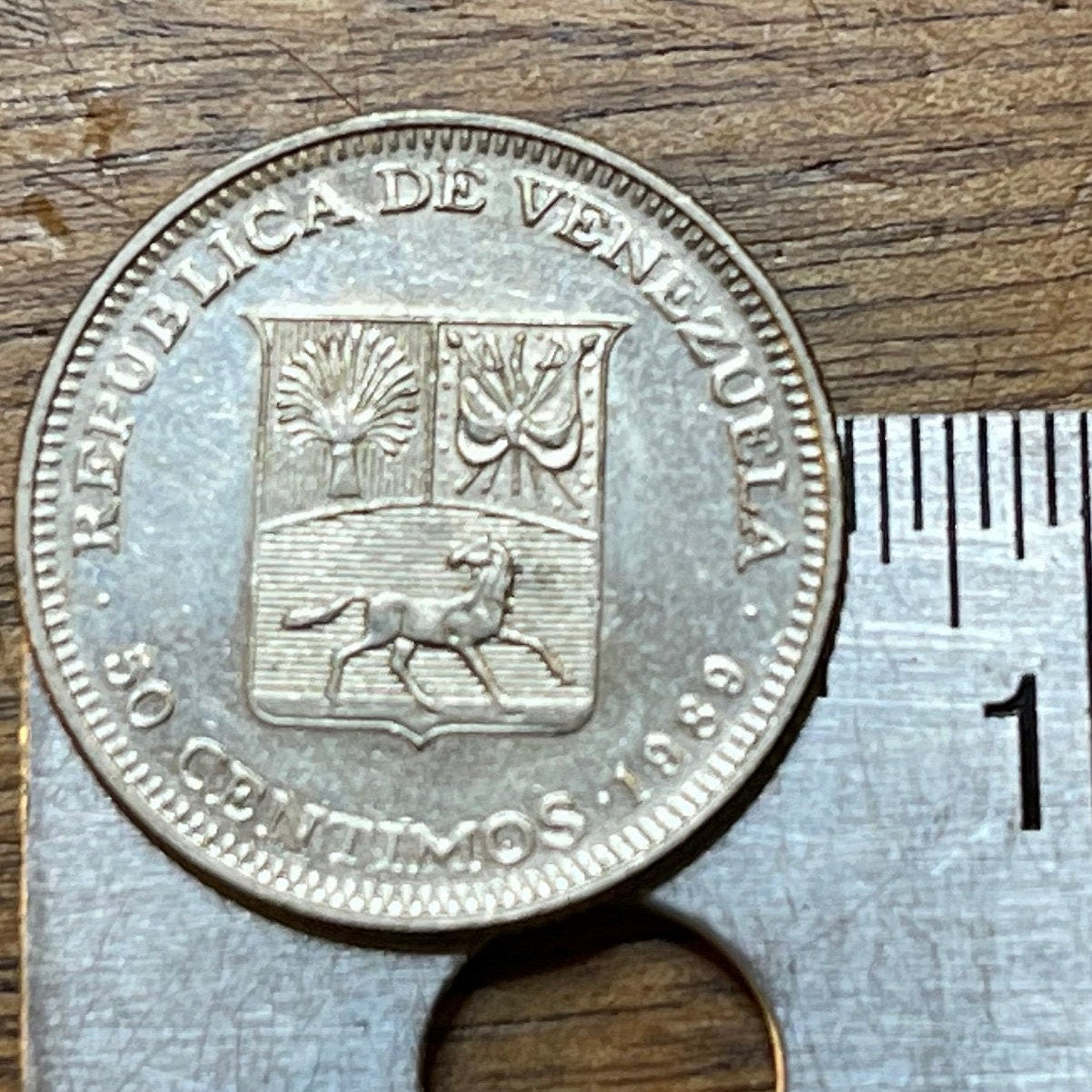elemintalshop
Simon Bolivar 50 Centimos Venezuela Authentic Coin Money for Jewelry and Craft Making
Simon Bolivar 50 Centimos Venezuela Authentic Coin Money for Jewelry and Craft Making
Couldn't load pickup availability
Simon Bolivar 50 Centimos Venezuela Authentic Coin Charm for Jewelry and Craft Making
Reverse
Bust left, flanked with legend.
Lettering: BOLÍVAR LIBERTADOR
Translation: Bolivar Liberator
Obverse
Coat of arms with legend above. Value and date below.
Lettering:
•REPÚBLICA DE VENEZUELA•
50 CENTIMOS
Translation:
Venezuela Republic
50 Centimes
Features
Issuer Venezuela
Period Fourth Republic (1953-1999)
Type Standard circulation coin
Years 1988-1990
Value 50 Céntimos (0.50 VEB)
Currency Bolívar (1879-2007)
Composition Nickel clad steel
Weight 3.2 g
Diameter 20 mm
Thickness 1.6 mm
Shape Round
Technique Milled
Orientation Coin alignment ↑↓
Demonetized 31 December 2011
Number N# 7296
References Y# 41a
Wikipedia:
Simón José Antonio de la Santísima Trinidad Bolívar y Palacios Ponte-Andrade y Blanco[1] (24 July 1783 – 17 December 1830), generally known as Simón Bolívar (Spanish: [siˈmom boˈliβaɾ] (About this soundlisten),[a] English: /ˈbɒlɪvər, -vɑːr/ BOL-iv-ər, -ar also US: /ˈboʊlɪvɑːr/ BOH-liv-ar] and also colloquially as El Libertador, "the Liberator", was a Venezuelan military and political leader who led what are currently the countries of Venezuela, Bolivia, Colombia, Ecuador, Peru, and Panama to independence from the Spanish Empire.
Bolívar was born into a wealthy family and as was common for the heirs of upper-class families in his day, was sent to be educated abroad at a young age, arriving in Spain when he was 16 and later moving to France. While in Europe he was introduced to the ideas of the Enlightenment, which later motivated him to overthrow the reigning Spanish in colonial South America. Taking advantage of the disorder in Spain prompted by the Peninsular War, Bolívar began his campaign for independence in 1808.[5] The campaign for the independence of New Granada was consolidated with the victory at the Battle of Boyacá on 7 August 1819. He established an organized national congress within three years. Despite a number of hindrances, including the arrival of an unprecedentedly large Spanish expeditionary force, the revolutionaries eventually prevailed, culminating in the patriot victory at the Battle of Carabobo in 1821, which effectively made Venezuela an independent country.
Following this triumph over the Spanish monarchy, Bolívar participated in the foundation of the first union of independent nations in Latin America, Gran Colombia, of which he was president from 1819 to 1830. Through further military campaigns, he ousted Spanish rulers from Ecuador, Peru, and Bolivia, the last of which was named after him. He was simultaneously president of Gran Colombia (present-day Venezuela, Colombia, Panama and Ecuador), Peru, and Bolivia, but soon after, his second-in-command, Antonio José de Sucre, was appointed president of Bolivia. Bolívar aimed at a strong and united Spanish America able to cope not only with the threats emanating from Spain and the European Holy Alliance but also with the emerging power of the United States. At the peak of his power, Bolívar ruled over a vast territory from the Argentine border to the Caribbean Sea.
Bolívar fought 100 battles, of which 79 were important, and during his campaigns rode on horseback 70,000 kilometers, which is 10 times more than Hannibal, three times more than Napoleon, and twice as much as Alexander the Great. Bolívar is viewed as a national icon in much of modern South America, and is considered one of the great heroes of the Hispanic independence movements of the early 19th century, along with José de San Martín, Francisco de Miranda and others. Towards the end of his life, Bolívar despaired of the situation in his native region, with the famous quote "all who served the revolution have plowed the sea". In an address to the Constituent Congress of the Republic of Colombia, Bolívar stated "Fellow citizens! I blush to say this: Independence is the only benefit we have acquired, to the detriment of all the rest."
Share



















